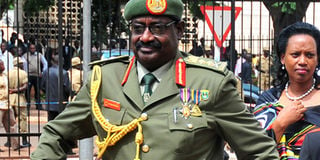Gen. Sejusa explains origin of name

On February 17 last year, General David Tinyefuza renounced his name and adopted the name David Sejusa according to a deed poll, a legal document enabling a person to officially change his or her name, he signed before a Commissioner for Oaths.
What you need to know:
The moustached-General last year renounced his age-old name Tinyefuza and adopted the name Sejusa according to a deed poll.
Kampala
When Gen. David Sejusa publicly announced last year that his name has always been Sejusa, not Tinyefuza as he was commonly referred to, not many believed him.
Many considered this simply a change of name while others still wondered why “Sejjusa”. But that was put to rest last Sunday.
While speaking at a function to honour the works of Bishop Jotham Mutebi, the retiring chairperson of Full Gospel Churches in Uganda at Makerere Full Gospel Church, the General explained the circumstances that surrounded his naming when he was just one day old. “I didn’t change my name,” he told the fully-packed church auditorium, “For the first time in public, let me explain why I have always been Sejusa.”
Gen. Sejusa’s father, Mzee Bwajojo, had lost nine of his children under mysterious circumstances. He was then advised by family members to abandon his wife who was considered as the cause of the tragedy.
Father’s role
“But my father refused. Instead, he converted to the faith of Abalokole abazukufu (a sect of born-again faith),” the General said, attracting applause from the congregation. The family members were not happy either when Mzee Bwajojo’s wife later gave birth to two girls consecutively.
“So when the third child was born, and my father was told that, ‘your wife has given birth,’ he asked, ‘what is the sex of the child?’ He was told the child was a boy. In relief, he said, ‘Sejjusa kulokoka’ (I don’t regret having converted to the born-again faith) – he named me Sejusa.”
“Sejusa has been my name since,” he emphasised, explaining that he only acquired the name “Tinyefuza” way later while joining secondary school at Masaka Barracks. “There, the officer asked for my name and I said ‘Sejusa’. He asked for my father’s. I said ‘Bwajojo’. He said that could not be true, wondering how a Munyakole could have given birth to a Muganda. He chased me away.”
The General took his friends’ advice that finally helped him enrol in the school. “They told me to change my name to Tinyefuza which also means Sejusa. Miraculously, when I went back to the barracks and referred to myself as Tinyefuza, the same officer could not recognise me, I was admitted.”
Gen. Sejusa, who many people are used to seeing in army attire, was this time dressed in a black suit with a white shirt and a matching black necktie. He thanked Makerere Full Church for the “spiritual nourishment” his grandmother Mzee Mirieli Komukama received from the church.
The function was organised in honour of Bishop Mutebi, who is retiring from active ministry. Mutebi has presided over the growth of the church, from barely 400 churches at the time he took office in 1989 to 1,473 today.




